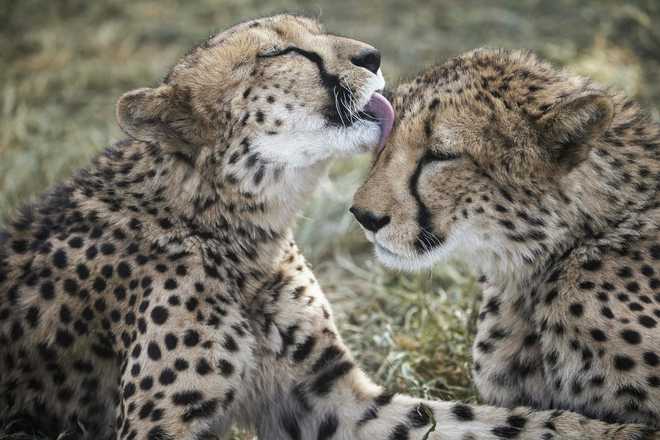London, December 27
The world's fastest land animal, the cheetah, is sprinting towards the edge of extinction and could soon be lost forever unless urgent, landscape-wide conservation action is taken, a new study has warned.
The study estimates that just 7,100 cheetahs remain globally, representing the best available estimate for the species to date.
The cheetah has been driven out of 91 per cent of its historic range, according to the study led by Zoological Society of London (ZSL), Panthera and Wildlife Conservation Society (WCS).
Asiatic cheetah populations have been hit hardest, with fewer than 50 individuals remaining in one isolated pocket of Iran, researchers said.
Due to the species' dramatic decline, the researchers are calling for the cheetah to be up-listed from 'Vulnerable' to 'Endangered' on the IUCN Red List of Threatened Species.
Typically, greater international conservation support, prioritisation and attention are granted to wildlife classified as 'Endangered', in efforts to stave off impending extinction.
"This study represents the most comprehensive analysis of cheetah status to date. Given the secretive nature of this elusive cat, it has been difficult to gather hard information on the species, leading to its plight being overlooked," said Sarah Durant, ZSL/WCS lead author and Project Leader for the Rangewide Conservation Programme for Cheetah and African Wild Dog, said.
"Our findings show that the large space requirements for cheetah, coupled with the complex range of threats faced by the species in the wild, mean that it is likely to be much more vulnerable to extinction than was previously thought," said Durant.
"The recent decisions made at the CITES CoP17 meeting in Johannesburg represent a significant breakthrough particularly in terms of stemming the illegal flow of live cats trafficked out of the Horn of Africa region.
"However, concerted action is needed to reverse ongoing declines in the face of accelerating land use changes across the continent," she said.
While renowned for its speed and spots, the degree of persecution cheetahs face both inside and outside of protected areas is largely unrecognised.
Even within guarded parks and reserves, cheetahs rarely escape the pervasive threats of human-wildlife conflict, prey loss due to overhunting by people, habitat loss and the illegal trafficking of cheetah parts and trade as exotic pets.
To make matters worse, as one of the world's most wide-ranging carnivores, 77 per cent of the cheetah's habitat falls outside of protected areas, researchers said.
Unrestricted by boundaries, the species' wide-ranging movements weaken law enforcement protection and greatly amplify its vulnerability to human pressures, they said.
Largely due to pressures on wildlife and their habitat outside of protected areas, Zimbabwe's cheetah population has plummeted from 1,200 to a maximum of 170 animals in just 16 years - representing an astonishing loss of 85 per cent of the country's cheetahs.
Scientists are now calling for an urgent paradigm shift in cheetah conservation, towards landscape-level efforts that transcend national borders and are coordinated by existing regional conservation strategies for the species.
A holistic conservation approach, which incentivises protection of cheetahs by local communities and trans-national governments, alongside sustainable human-wildlife coexistence is paramount to the survival of the species.
"We've just hit the reset button in our understanding of how close cheetahs are to extinction. The take-away from this pinnacle study is that securing protected areas alone is not enough," said Panthera's Cheetah Programme Director, Kim Young-Overton.
"We must think bigger, conserving across the mosaic of protected and unprotected landscapes that these far-ranging cats inhabit, if we are to avert the otherwise certain loss of the cheetah forever," said Young-Overton.
The study was published in the journal Proceedings of the National Academy of Sciences. — PTI
Unlock Exclusive Insights with The Tribune Premium
Take your experience further with Premium access.
Thought-provoking Opinions, Expert Analysis, In-depth Insights and other Member Only Benefits
Already a Member? Sign In Now











